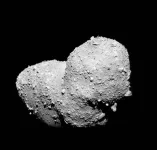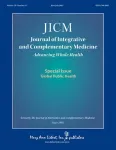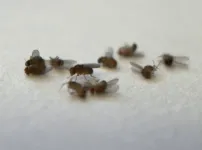(Press-News.org) Billions of people around the world face water insecurity. Although there are numerous projects from governments, NGOs, and private corporations who are committed to providing safely managed water and sanitation by 2030, a new study advocates for more holistic evaluation of water, sanitation, and hygiene (WASH) interventions.
According to the study by Justin Stoler, associate professor in the University of Miami College of Arts and Sciences Department of Geography and Sustainable Development, issues like mental health, violence, injury, and discrimination, are examples of additional challenges that must be measured when considering global WASH projects.
“Most of the world views water projects through the lens of water quality, which I call the ‘20th-century mentality.’ Water quality is still important, but there are additional consequences of water scarcity that need to be considered when it comes to individual health and well-being,” said Stoler. “Water insecurity can ruin people’s lives in lots of ways. But water-quality data still drives the narrative of what safe water means without considering other elements like mental health, gender disparities, and injuries that can occur when retrieving water.”
Even when water is safe to drink, millions of people face harassment, assault, anxiety, depression, or work, school, or family care absenteeism when retrieving or consuming household water, according to the study.
Stoler adds that these additional stressors are rarely considered in studies and data that are used to drive policy and implement WASH projects and infrastructure needs. As a result, he thinks that water interventions probably undersell their impacts, which leads to governments and policymakers under-valuing WASH projects.
“For example, the media often presents images of women and children collecting water. But what we rarely see is the long trek to reach that water source, a trip that could be complicated by challenging terrain, animal attacks, or anxiety about male predators along the way,” said Stoler. “There’s a physiological burden—carrying loads of water every day takes a toll on the human body—as well as a mental health burden that includes the anxiety women experience from being vulnerable to violence or injury when retrieving water, or potential intimate partner violence at home if water supplies are insufficient.
“WASH projects often mitigate these circumstances,” he added,” but program managers tend to be so focused on water quality that they are not measuring other important quality-of-life improvements.”
The study was the result of an interdisciplinary collaboration with researchers from the Pulte Institute for Global Development and Keough School of Global Affairs at the University of Notre Dame.
Stoler worked with two Notre Dame colleagues: Danice Brown Guzmán, an associate director for the Pulte Institute’s Evidence and Learning Division, who is an expert in experimental and large-scale data collection to measure impacts from food security, gender, education, and WASH projects; and Ellis Adams, associate professor of geography and environmental policy at the Keough School of Global Affairs, who studies the social, political, institutional, and governance dimensions of natural resources.
Their project also generated a policy brief for the Pulte Institute’s Policy Brief Series and a comment in The Lancet Global Health.
“This project provides a roadmap for a new approach to monitoring and evaluating WASH programs that will more fully highlight the broad impact of these interventions,” said Stoler. “Our hope is that by showcasing the wide-ranging impacts of WASH projects—and their transformative relationships with other grand challenges related to poverty, food security, education, and others—we can attract financing from global institutions to ramp up WASH projects and make global safe water a reality.”
The study, “Measuring transformative WASH: A new paradigm for evaluating water, sanitation, and hygiene interventions,” is now available in WIREs Water.
END
New approaches to evaluating water interventions around the globe
A study led by Justin Stoler, University of Miami associate professor, addresses the importance of monitoring and evaluating a broader set of impacts related to clean water projects.
2023-06-13
ELSE PRESS RELEASES FROM THIS DATE:
ASCAP introduces slate of AI initiatives to help music creators navigate the future while protecting their work
2023-06-13
NEW YORK, June 13, 2023 – With the potential for artificial intelligence (AI) to create both massive disruption and great opportunity within the music industry, ASCAP — the only US PRO that operates on a not-for-profit basis — is introducing a slate of AI initiatives to help music creators navigate the future while protecting their work. These newly announced initiatives include: adoption by the ASCAP Board of Directors of a set of key ASCAP AI principles, creator education, startup incubation and policy development. Building upon ASCAP’s strong ...
Study in mice links heat-damaged DNA in food to possible genetic risks
2023-06-13
Researchers have newly discovered a surprising and potentially significant reason why eating foods frequently cooked at high temperatures, such as red meat and deep-fried fare, elevates cancer risk. The alleged culprit: DNA within the food that’s been damaged by the cooking process.
As shown for the first time known to the authors, this study by Stanford scientists and their collaborators at the National Institute of Standards and Technology (NIST), the University of Maryland, and Colorado State University reveals that components of heat-marred DNA can be absorbed during digestion and incorporated into the DNA of the consumer. That uptake directly ...
UC Irvine neuroscientists develop ‘meta-cell’ to move Alzheimer’s fight forward
2023-06-13
Irvine, Calif., June 13, 2023 – University of California, Irvine neuroscientists probing the gene changes behind Alzheimer’s disease have developed a process of making a “meta-cell” that overcomes the challenges of studying a single cell. Their technique has already revealed important new information and can be used to study other diseases throughout the body. Details about the meta-cell – created by researchers with the UCI Institute for Memory Impairments and Neurological Disorders, known as UCI MIND – were published in the online journal Cell Press.
Technologies called transcriptomics that study sets of RNA within organisms ...
What’s an underrated way to study decisions? Think out loud
2023-06-13
Think fast: if you’re running a race and overtake the person in second place, what position are you in? Many people instinctively respond that you’re in first place. However, upon reflection, some people realize the correct answer is that you’re now in second place: the former number-two runner slipped into third as you overtook them.
Trick questions of this kind are invaluable to cognitive scientists because they shed light on the cognitive quirks that shape our decision-making. “These aren’t just trick questions,” explained Nick Byrd, a philosopher-scientist and Intelligence Community Fellow who led the research at Stevens ...
Pass the salt: This space rock holds clues as to how Earth got its water
2023-06-13
Sodium chloride, better known as table salt, isn't exactly the type of mineral that captures the imagination of scientists. However, a smattering of tiny salt crystals discovered in a sample from an asteroid has researchers at the University of Arizona Lunar and Planetary Laboratory excited, because these crystals can only have formed in the presence of liquid water.
Even more intriguing, according to the research team, is the fact that the sample comes from an S-type asteroid, a category known to mostly lack hydrated, or water-bearing, minerals. The discovery strongly suggests ...
Understanding tumor microenvironment with photoacoustic spectral analysis
2023-06-13
Tumors are not just isolated clumps of abnormal cells but are associated with more complex system known as the “tumor microenvironment” (TME). Over the past few years, research has revealed that the TME consists of a complex combination of blood vessels, connective tissue, and a matrix of extracellular proteins and molecules. Most importantly, the composition of the TME is different from that of nearby healthy tissues. In particular, the lipid and collagen contents of tumors differ from those of normal tissues, making them important potential biomarkers for diagnosing various types of ...
Special issue of JICM on global public health and the Declaration of Astana
2023-06-13
A special focus issue of the peer-reviewed Journal of Integrative and Complementary Medicine (JICM) on Global Public Health is a response to the Declaration of Astana, developed by the World Health Organization and UNICEF. With contributions from traditional, complementary, and integrative medicine (TCIM) scholars and thought leaders around the world, the issue showcases research and scholarship examining the opportunities and challenges that TCIM approaches offer global health to governments and health service providers seeking to fulfill ...
ASU establishes ʻĀkoʻakoʻa, a new collaborative effort to seed renewed connection between human and coral communities in Hawaiʻi
2023-06-13
With a group of core partners, Arizona State University is creating a new $25 million collaboration to preserve and restore vitality to Hawaiʻi’s coral reefs and the health of its coastlines.
The community-based effort looks to fuse state-of-the-art science programs with the leadership and cultural knowledge of Hawaiʻi’s community partners to enable coastal and reef sustainability for generations to come. Named ʻĀkoʻakoʻa (pronounced ah kō-a kō-a), the effort shares a dual meaning ʻto assemble’ and ‘coral.’
“For ...
Men and women with migraine both carry an increased risk of ischemic stroke
2023-06-13
Women and men who experience migraine headaches also carry an elevated risk of having an ischemic stroke, but women alone may carry an additional risk of heart attack and hemorrhagic stroke, according to a new study led by Cecilia Hvitfeldt Fuglsang of Aarhus University, Denmark publishing June 13th in the open access journal PLOS Medicine.
People diagnosed with migraine are believed to have a higher risk of experiencing a heart attack or stroke before the age of 60. Previous studies have suggested ...
How seeing corpses reduces the lifespan of flies
2023-06-13
Researchers led by Christi Gendron at the University of Michigan, US, have found the link between death perception and reduced aging in flies. Their new study, published June 13th in the open access journal PLOS Biology shows that a specific group of brain cells in the fly, called R2 and R4 neurons, are activated when flies encounter other dead flies, and that this increased activity leads to more rapid aging.
Aging is a complex process that can be affected by both genetics and the environment. While we know that perceptual experiences can affect ...
LAST 30 PRESS RELEASES:
Brain cells drive endurance gains after exercise
Same-day hospital discharge is safe in selected patients after TAVI
Why do people living at high altitudes have better glucose control? The answer was in plain sight
Red blood cells soak up sugar at high altitude, protecting against diabetes
A new electrolyte points to stronger, safer batteries
Environment: Atmospheric pollution directly linked to rocket re-entry
Targeted radiation therapy improves quality of life outcomes for patients with multiple brain metastases
Cardiovascular events in women with prior cervical high-grade squamous intraepithelial lesion
Transplantation and employment earnings in kidney transplant recipients
Brain organoids can be trained to solve a goal-directed task
Treatment can protect extremely premature babies from lung disease
Roberto Morandotti wins prestigious Max Born Award for pioneering research in quantum photonics
Scientists map brain's blood pressure control center
Acute coronary events registry provides insights into sex-specific differences
Bar-Ilan University and NVIDIA researchers improve AI’s ability to understand spatial instructions
New single-cell transcriptomic clock reveals intrinsic and systemic T cell aging in COVID-19 and HIV
Smaller fish and changing food webs – even where species numbers stay the same
Missed opportunity to protect pregnant women and newborns: Study shows low vaccination rates among expectant mothers in Norway against COVID-19 and influenza
Emotional memory region of aged brain is sensitive to processed foods
Neighborhood factors may lead to increased COPD-related emergency department visits, hospitalizations
Food insecurity impacts employees’ productivity
Prenatal infection increases risk of heavy drinking later in life
‘The munchies’ are real and could benefit those with no appetite
FAU researchers discover novel bacteria in Florida’s stranded pygmy sperm whales
DEGU debuts with better AI predictions and explanations
‘Giant superatoms’ unlock a new toolbox for quantum computers
Jeonbuk National University researchers explore metal oxide electrodes as a new frontier in electrochemical microplastic detection
Cannabis: What is the profile of adults at low risk of dependence?
Medical and materials innovations of two women engineers recognized by Sony and Nature
Blood test “clocks” predict when Alzheimer’s symptoms will start
[Press-News.org] New approaches to evaluating water interventions around the globeA study led by Justin Stoler, University of Miami associate professor, addresses the importance of monitoring and evaluating a broader set of impacts related to clean water projects.






